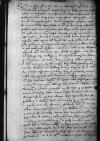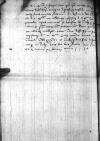Letter #1579
[Ioannes DANTISCUS] to [Mauritius FERBER]Cracow (Kraków), 1537-02-11
English register: Dantiscus recounts further events from the Diet in Cracow. He cannot write to Ferber more extensively, as he promised in his previous letter, because he is busy packing before his departure. Last Sunday the young king (Sigismund II Augustus) took the oath before the estates. Most of the Crown deputies left ostentatiously on the Saturday before the swearing-in. The king (Sigismund I) has promised the Prussian Council’s delegates that he will pledge on behalf of his son, in a special memorandum, that the existing privileges enjoyed by Royal Prussia will be maintained. If Sigismund Augustus should fail to comply after his father’s death, the Prussians will be able to consider themselves freed of the obligation of loyalty towards him. A document containing the appropriate provisions (the “Confirmation of rights and privileges”) has been delivered to the Crown estates. The Prussian councilors are worried that they have not received it yet, and will spare no effort to obtain it. The king has rejected the objections against the Prussian Council submitted by the Prussian gentry and has given the gentry’s envoys a sharp response (cf. IDL 1594). The sentence passed by Dantiscus in Elbląg on the matter of the widow Vagslagerinn (Woszczkowa) has been upheld by the king. The dispute between the residents of Płock and Toruń, concerning the right to transport herring up the Vistula, has been resolved. Two members of the Royal Council: the Poznań voivode (Łukasz Górka) or his son the Poznań castellan (Andrzej Górka,) and the Inowrocław voivode (Janusz Latalski), have been appointed to help the Prussian Council (at the next assembly) in mitigating the disputes between the gentry and the Prussian cities. The posts of Grand Chancellor and Vice-Chancellor are to be given to the bishop of Przemyśl (Piotr Gamrat) and the nephew of the deceased Cracow castellan Szydłowiecki (Paweł Wolski). The bishop of Płock (Jan Chojeński) is departing for his diocese. The Warmia provost (Paweł Płotowski) is trying to justify his conduct to Dantiscus. Since Płotowski has not managed to harm him, Dantiscus finds it easy to accept his remorse. Dantiscus plans to leave Cracow the next day. He fears that now the weather has changed, the Vistula could thaw, so he has abandoned his plan to travel across Mazowsze straight to Warmia. He will travel to Lubawa first, and from there go on to meet Ferber. That’s when they will discuss all relevant matters in detail.
Manuscript sources:
Auxiliary sources:
Prints:
| ||||||||||
Text & apparatus & commentary Plain text Text & commentary Text & apparatus Excerpts concerning Dantiscus' travels
Reverendissime in Christo Pater et Domine, Domine mi observandissime. Salutem et mei commendationem plurimam.
Scripsi hinc II-a huius, quae tum se offerebant, in compendio. Ad praesens etiam, colligens sarcinulas, non possum, ut velim utque scripsi in novissimis, esse copiosior, summatim tamen omnia perstringam. Dominica Sexagesimae praeterita maiestas regia iunior omnibus Regni statibus et nobis, qui hic sumus, ius iurandum praestitit, quod maior nuntiorum pars Regni audire noluit, priori die insalutato – ut aiunt – hospite abeuntes, priusquam ius iurandum esset praestitum. De nostris privilegiis cum maiestate regia seniore sumus collocuti. Respondit maiestas eius se nobis daturam litteras, quibus polliceri vult pro filio, quod omnia in privilegiis nostris contenta observare debeat. Hoc ipsum si post mortem patris non fecerit, nos etiam in nullo ei esse obligatos. Istiusmodi etiam litteras omnibus Regni statibus iam dedit. Nostras adhuc non habemus, utque intelleg written over x⌈xgg written over x⌉imus, non eiusmodi nobis superinscribed⌈nobisnobis superinscribed⌉ tenoris dari debent, quod non parum nos turbat. Daturi tum sumus adhuc operam, ut tales iuxta promissum habere possimus. Super libello famoso, quod contra nos hic obtulerunt nostrae nobilitatis nuntii, satis eis est a maiestate regia acriter responsum, verbisque duris et pro meritis correpti nihil eorum, quae petiverant, obtinuerunt, omnibusque infectis hinc non sine turbatione discedunt etc.
Causa viduae Vagslagerin determinata est iuxta nostram Elbingi latam sententiam. Dissidium inter Thoronenses et Plocenses compositum ea est lege, quod quibuslibet annis Plocensibus licebit centum lastas duntaxat alecum adverso Vistula ad suos educere, aliis regnicolis, hoc est spiritualibus et nobilibus, decebit non amplius quam pro usu domus in scaphis suis ultra Thoroniam ascendendo habere etc.
Ad sopiendam controversiam gravaminum, quae nobilitas nostra cum magnis et parvis habet civitatibus, deputati sunt unanobiscum consiliarii Regni duo: dominus palatinus Posnaniensis aut filius eius castellanus, et palatinus Iuniwladislaviensis, de quibus novissime scripsi etc.
Sigilla dabuntur domino Premisliensi(!) et nepoti ex sorore olim castellani Cracoviensis Shidlowieczki. Reverendissimus dominus Plocensis se hinc ad ecclesiam suam confert etc.
Decreveram, ut scripsi, hinc recta nuntium meum per Masoviam ad Dominationem Vestram Reverendissimam mittere et ipsemet eodem itinere  AAWO, AB, D. 67, f. 52v ad Dominationem Vestram Reverendissimam subsequi, verum, cum tempora mutata sunt propter gla hidden by binding⌈[gla]gla hidden by binding⌉ciorum dissolutionem, veritus, ne liquefactus Vistula me impediret hidden by binding⌈[ret]ret hidden by binding⌉, coactus sum mutare sententiam, ex Lubavia Deo bene favente hidden by binding⌈[nte]nte hidden by binding⌉ ad Dominationem Vestram Reverendissimam me collaturus. Praepositus Dominationis Vestrae Reverendissimae hac hora hidden by binding⌈[ra]ra hidden by binding⌉ prandet apud me. Conatur se excusare de omnibus, quod facile hidden by binding⌈[e]e hidden by binding⌉ admitto, cum
nocere non potuerit etc.
AAWO, AB, D. 67, f. 52v ad Dominationem Vestram Reverendissimam subsequi, verum, cum tempora mutata sunt propter gla hidden by binding⌈[gla]gla hidden by binding⌉ciorum dissolutionem, veritus, ne liquefactus Vistula me impediret hidden by binding⌈[ret]ret hidden by binding⌉, coactus sum mutare sententiam, ex Lubavia Deo bene favente hidden by binding⌈[nte]nte hidden by binding⌉ ad Dominationem Vestram Reverendissimam me collaturus. Praepositus Dominationis Vestrae Reverendissimae hac hora hidden by binding⌈[ra]ra hidden by binding⌉ prandet apud me. Conatur se excusare de omnibus, quod facile hidden by binding⌈[e]e hidden by binding⌉ admitto, cum
nocere non potuerit etc.
Nova, quae habeo, ex adiunctis intelliget, coram omnia diffusius, ut spero, brevi hidden by binding⌈[revi]revi hidden by binding⌉ expositurus Dominationi Vestrae Reverendissimae, cuius paterno amori me commendo, Deumque precor, ut eandem quam diutissime sospitet prospe hidden by binding⌈[spe]spe hidden by binding⌉retque in omnibus. Cras Deo bene favente hinc sum iturus hidden by binding⌈[rus]rus hidden by binding⌉.
Ex Cracovia, XI Februarii anno 1537.

